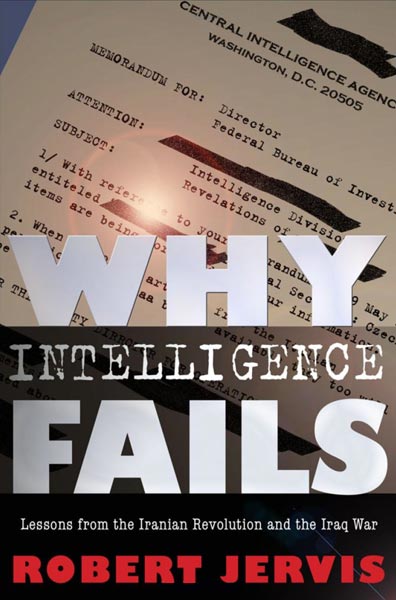 Why Intelligence Fails Why Intelligence Fails
Lessons from the Iranian Revolution and the Iraq War
Robert L. Jervis
Shortlisted for the 2011 Arthur Ross Book Award given by the Council on Foreign Relations Narrated by Kevin Pierce
Available from Audible
Book published by Cornell University Press
The U.S. government spends enormous resources each year on the gathering and analysis of intelligence, yet the history of American foreign policy is littered with missteps and misunderstandings that have resulted from intelligence failures. In Why Intelligence Fails, Robert Jervis examines the politics and psychology of two of the more spectacular intelligence failures in recent memory: the mistaken belief that the regime of the Shah in Iran was secure and stable in 1978, and the claim that Iraq had active WMD programs in 2002.
The Iran case is based on a recently declassified report Jervis was commissioned to undertake by CIA thirty years ago and includes memoranda written by CIA officials in response to Jervis's findings. The Iraq case, also grounded in a review of the intelligence community's performance, is based on close readings of both classified and declassified documents, though Jervis's conclusions are entirely supported by evidence that has been declassified. In both cases, Jervis finds not only that intelligence was badly flawed but also that later explanations—analysts were bowing to political pressure and telling the White House what it wanted to hear or were willfully blind—were also incorrect. Proponents of these explanations claimed that initial errors were compounded by groupthink, lack of coordination within the government, and failure to share information. Policy prescriptions, including the recent establishment of a Director of National Intelligence, were supposed to remedy the situation.
In Jervis's estimation, neither the explanations nor the prescriptions are adequate. The inferences that intelligence drew were actually quite plausible given the information available. Errors arose, he concludes, from insufficient attention to the ways in which information should be gathered and interpreted, a lack of self-awareness about the factors that led to the judgments, and an organizational culture that failed to probe for weaknesses and explore alternatives. Evaluating the inherent tensions between the methods and aims of intelligence personnel and policymakers from a unique insider's perspective, Jervis forcefully criticizes recent proposals for improving the performance of the intelligence community and discusses ways in which future analysis can be improved.
Robert L. Jervis is Adlai E. Stevenson Professor of International Politics at Columbia University. He is the author of many books, including The Meaning of the Nuclear Revolution and American Foreign Policy in a New Era.
REVIEWS:
“In this cogently argued and revealing book, Jervis, a veteran CIA consultant, uses the Iranian and Iraqi cases to dissect why, in some circumstances, intelligence fails to provide accurate analysis to policymakers.... The section on Iran ... identifies a number of errors with respect to intelligence on Iran, ranging from the mistaken belief that the shah was strong enough to undertake decisive and sustained action against his opponents to underestimating the role played by religion and nationalism in Iranian society. In the section on Iraq ... Jervis contends that the fundamental reason for the WMD intelligence failure was that it made the most sense to assume that the country possessed WMD, given the Iraqi government's previous behavior. Highly recommended for all interested academic and general readers.”
—Library Journal “In Why Intelligence Fails, Jervis examines two important U.S. intelligence lapses—the fall of the Shah in Iran and WMDs in Iraq—and tries to account for what went awry. After both, the CIA hired Jervis—a longtime student of international affairs—to help the agency sort out its mistakes. He thus brings an invaluable perspective as a smart outsider with sufficient inside access to appraise the agency's blind spots.”
—Wall Street Journal “Jervis's practical experience is as a consultant with the CIA, and he offers a refreshing analysis and defense of this engagement with a government agency. Why Intelligence Fails feels like a reflection on a lifetime of thinking about intelligence.... The case studies (one of which is a slightly redacted version of the lessons-learned report Jervis wrote for the CIA about the Iranian Revolution, complete with comments made on it by senior CIA figures) ably highlight the lessons Jervis wishes us to take away from his study. Most importantly, he argues that further reforms of the intelligence machinery—a favorite reflex of politicians—will not necessarily produce improvements to intelligence product.”
—International Affairs “There is no one better than Robert Jervis at dissecting intelligence, and this book is proof. Happily, at long, long last he has managed to free his three-decade-old inside postmortem on intelligence failure during the early stages of the Iranian revolution from the dark of classification, and he has coupled that with his recent writings on intelligence's woeful performance over those Iraqi weapons of mass destruction that weren't. His conclusion is both wise and discomfiting: In both cases, doing better 'would have been to make the intelligence judgments less certain rather than to reach fundamentally different conclusions. Furthermore, better intelligence would not have led to an effective policy.”
—Gregory F. Treverton, RAND Corporation “Why Intelligence Fails is a valuable and unique book combining a quasi-memoir from an eminent political scientist, well-applied theory, and two important case studies, with a healthy regard for 'insoluble dilemmas of intelligence and policy-making.”
—Bruce W. Jentleson, Duke University “This is the sort of thorough, integrative, and provocative work we've come to expect from Robert Jervis. Students of the craft will find much to debate and ponder in this thoughtful assessment.”
—John McLaughlin, Distinguished Practitioner in Residence, Paul H. Nitze School of Advanced International Studies, The Johns Hopkins University
|

